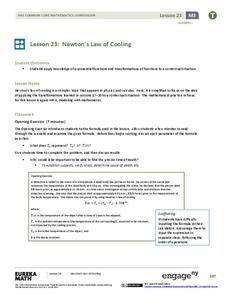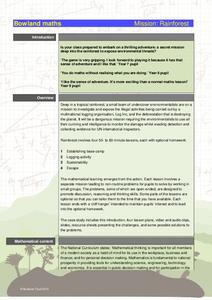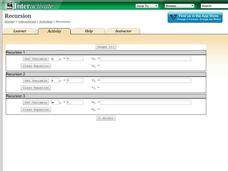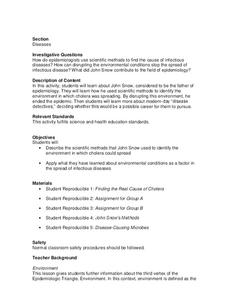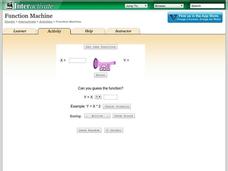K5 Learning
What Police and Detectives Do
What do police and detectives do to keep their community safe? Six short-answer questions make up a worksheet designed to reinforce reading comprehensions skills while providing information about police officers and detectives.
NOAA
Lost City Chemistry Detectives
In 1977, scientists discovered hot springs in the middle of deep, cold ocean waters near the Galapagos Islands. Scholars research the chemical reactions that explain what scientists found at the Lost City. A discussion connects many...
Mr. Roughton
Cold Case Rome
Pupils are transformed into detectives in the case to solve the motive behind the assassination of Julius Caesar. This resource includes eight engaging "exhibits" of unique primary and secondary sources for students to analyze...
Mr. Roughton
Late Middle Ages Dossiers
Young detectives are given the "clues" to investigate whether King John should be remembered as a poor ruler of England, particularly in comparison in King Richard. They analyze historical informational texts and work in...
EngageNY
Newton’s Law of Cooling
As part of an investigation of transformations of exponential functions, class members use Newton's Law of Cooling as an exponential model to determine temperature based on varying aspects. The resource makes comparisons between...
Bowland
Mission: Rainforest
Young environmentally conscious mathematicians solve a variety of problems related to the central theme of uncovering illegal logging activities. They determine a base camp based on given constraints, investigate logging activities and...
Shodor Education Foundation
Transmographer
Introducing ... the Transmographer. Young mathematicians investigate translations, reflections, and rotations. The applet lets users perform transformations on triangles, squares, and parallelograms.
Shodor Education Foundation
Cross Section Flyer
Scholars see cross sections come to life using an app to investigate cross sections of three-dimensional solids. They look at prisms, pyramids, cylinders, cones, and double cones.
Shodor Education Foundation
Recursion
Perform the operation ... and then do it again. Scholars investigate recursive formulas by creating and graphing them. Using the interactive, pupils set the variable, determine the initial value, and type in a recursive formula.The...
Shodor Education Foundation
Rabbits and Wolves
A change in a parameter can end in overpopulation. The resources gives pupils the opportunity to control the parameters of rabbits and wolves in a natural setting. Using the set parameters, the simulation runs and displays the population...
Scouts
The Deadly Picnic: A Lab on Deductive Reasoning
Whodunnit? Find out who killed Mr. Brooks through a logical examination of evidence. Class members fill out a couple of data tables to help them pin down the suspect. After they've figured out just who the culprit is, pupils compose...
Cornell University
Plant Cell Crime Scene
Use science to solve the mystery of the Poplar murder. Pupils use forensic botany to determine if a suspect could be the killer. By analyzing images from a Transmission Electron Microscope, learners determine if the material found on the...
Roy Rosenzweig Center for History and New Media
European Explorers
To compare how the Spanish, French, and English approached the exploration of North America, class groups examine primary source documents and become experts on one of four explorers: Francisco Coronado, Robert LaSalle, Samuel de...
EngageNY
The Power of Algebra—Finding Primes
Banks are responsible for keeping our financial information safe. Mathematics is what allows them to do just that! Pupils learn the math behind the cryptography that banks rely on. Using polynomial identities, learners reproduce the...
Centers for Disease Control and Prevention
Diseases
During a cholera outbreak, scientists presented two theories; one theory was based on miasma and the other on germs and contaminated water. The lesson looks at the scientific process for finding the real culprit.
Teach Engineering
Electromagnetic Radiation
How can nanoparticles be used in the battle against skin cancer. Class members take on the question as they gather information about electromagnetic radiation, specifically ultraviolet radiation. Pupils learn about the mathematical...
Shodor Education Foundation
Function Machine
Machines can be so helpful sometimes. A simple interactive has learners enter input values for a function machine and observe output values. These values help determine a function that represents the input-output relationship in the...
Shodor Education Foundation
Squaring the Triangle
Teach budding mathematicians how to square a triangle with an interactive that shows a graphical proof of the Pythagorean Theorem. Pupils alter the lengths of the legs using sliders. Using the inputted lengths, the applet displays the...
Tate
Tate Museum: The Case of the Mysterious Object; Henry Moore Sculpture
Learn about a sculpture by the British monumental figurative sculptor, Henry Moore, in this interactive investigation of a piece by Moore, which looks at every apsect of the piece from how it was made to who made it.
PBS
Pbs Learning Media: The Hound of the Baskervilles 1: Meet Sherlock Holmes
Students investigate the iconic and much-beloved character of Sherlock Holmes, as well as the mystery genre, in this excerpt from Masterpiece's 2002 version of The Hound of the Baskervilles. As students are introduced to Holmes, they use...
TED Talks
Ted: Ted Ed: Why Do Hospitals Have Particle Accelerators?
Doctors are using injected radioactive drugs that circulate through the body and act as a beacon for PET scanners. These diagnostic tools can detect the spread of diseases before they can be spotted with other types of imaging. Pedro...




